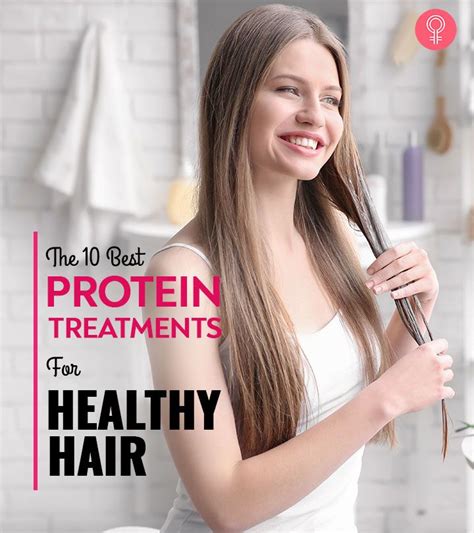Protein is an essential nutrient for healthy hair. It helps to strengthen the hair shaft, prevent breakage, and promote growth. When hair is damaged, it loses protein, which can lead to weakness, breakage, and split ends.

There are many different ways to add protein to your hair, but one of the most effective is to use a natural protein treatment. Natural protein treatments are gentle on the hair and can help to restore its strength and vitality.
Here are 10 of the best natural protein treatments for hair:
1. Egg Mask
Eggs are a great source of protein, and they can be used to make a simple and effective hair mask. To make an egg mask, simply whisk together one egg and one tablespoon of water. Apply the mask to your hair, cover it with a shower cap, and let it sit for 30 minutes. Rinse the mask out with cold water and shampoo and condition as usual.
2. Yogurt Mask
Yogurt is another good source of protein, and it can also be used to make a hair mask. To make a yogurt mask, simply mix together one cup of plain yogurt and one tablespoon of honey. Apply the mask to your hair, cover it with a shower cap, and let it sit for 30 minutes. Rinse the mask out with cold water and shampoo and condition as usual.
3. Avocado Mask
Avocados are a rich source of protein, vitamins, and fatty acids, which makes them a great choice for a hair mask. To make an avocado mask, simply mash one ripe avocado and add one tablespoon of olive oil. Apply the mask to your hair, cover it with a shower cap, and let it sit for 30 minutes. Rinse the mask out with cold water and shampoo and condition as usual.
4. Coconut Milk Mask
Coconut milk is a good source of protein and lauric acid, which can help to strengthen the hair shaft. To make a coconut milk mask, simply mix together one cup of coconut milk and one tablespoon of honey. Apply the mask to your hair, cover it with a shower cap, and let it sit for 30 minutes. Rinse the mask out with cold water and shampoo and condition as usual.
5. Banana Mask
Bananas are a good source of protein, potassium, and vitamins, which makes them a great choice for a hair mask. To make a banana mask, simply mash one ripe banana and add one tablespoon of honey. Apply the mask to your hair, cover it with a shower cap, and let it sit for 30 minutes. Rinse the mask out with cold water and shampoo and condition as usual.
6. Honey Mask
Honey is a natural humectant, which means that it helps to keep the hair hydrated. Honey also contains antibacterial and antifungal properties, which can help to keep the scalp healthy. To make a honey mask, simply mix together one cup of honey and one tablespoon of olive oil. Apply the mask to your hair, cover it with a shower cap, and let it sit for 30 minutes. Rinse the mask out with cold water and shampoo and condition as usual.
7. Olive Oil Mask
Olive oil is a rich source of vitamins, minerals, and fatty acids, which makes it a great choice for a hair mask. Olive oil can help to strengthen the hair shaft, prevent breakage, and promote growth. To make an olive oil mask, simply warm one cup of olive oil and apply it to your hair. Cover your hair with a shower cap and let the mask sit for 30 minutes. Rinse the mask out with cold water and shampoo and condition as usual.
8. Argan Oil Mask
Argan oil is a rich source of vitamins, minerals, and fatty acids, which makes it a great choice for a hair mask. Argan oil can help to strengthen the hair shaft, prevent breakage, and promote growth. To make an argan oil mask, simply warm one cup of argan oil and apply it to your hair. Cover your hair with a shower cap and let the mask sit for 30 minutes. Rinse the mask out with cold water and shampoo and condition as usual.
9. Jojoba Oil Mask
Jojoba oil is a natural wax that is very similar to the sebum that is produced by the scalp. Jojoba oil can help to balance the scalp’s pH level, prevent dandruff, and promote hair growth. To make a jojoba oil mask, simply warm one cup of jojoba oil and apply it to your hair. Cover your hair with a shower cap and let the mask sit for 30 minutes. Rinse the mask out with cold water and shampoo and condition as usual.
10. Castor Oil Mask
Castor oil is a thick, viscous oil that is rich in ricinoleic acid. Ricinoleic acid has anti-inflammatory and antibacterial properties, which can help to soothe the scalp and promote hair growth. To make a castor oil mask, simply warm one cup of castor oil and apply it to your hair. Cover your hair with a shower cap and let the mask sit for 30 minutes. Rinse the mask out with cold water and shampoo and condition as usual.
How to Choose the Right Natural Protein Treatment for Your Hair
There are many different natural protein treatments for hair, so it is important to choose the one that is right for your hair type. If you have dry or damaged hair, you will need a protein treatment that is rich in moisture. If you have oily hair, you will need a protein treatment that is light and non-greasy.
You should also consider the porosity of your hair. Porosity refers to the ability of your hair to absorb moisture. If you have high-porosity hair, you will need a protein treatment that is applied to wet hair. If you have low-porosity hair, you will need a protein treatment that is applied to dry hair.
How to Use a Natural Protein Treatment for Hair
To use a natural protein treatment for hair, follow these steps:
- Wash your hair with a clarifying shampoo. This will remove any product buildup or dirt from your hair.
- Towel dry your hair. Do not brush your hair, as this can cause breakage.
- Apply the protein treatment to your hair. Be sure to follow the directions on the package.
- Cover your hair with a shower cap. This will help to keep the protein treatment in place.
- Let the protein treatment sit for the amount of time specified on the package.
- Rinse the protein treatment out of your hair with cold water.
- Shampoo and condition your hair as usual.
Benefits of Using a Natural Protein Treatment for Hair
There are many benefits to using a natural protein treatment for hair. Natural protein treatments can help to:
- Strengthen the hair shaft
- Prevent breakage
- Promote growth
- Repair damage
- Improve moisture retention
- Add shine
Risks of Using a Natural Protein Treatment for Hair
There are no known risks associated with using a natural protein treatment for hair. However, it is important to follow the directions on the package and to avoid using a protein treatment more often than once a week. Protein overload can lead to brittle hair that is prone to breakage.
Conclusion
Natural protein treatments are a gentle and effective way to improve the health of your hair. By following the tips in this article, you can choose the right protein treatment for your hair type and use it safely and effectively.
